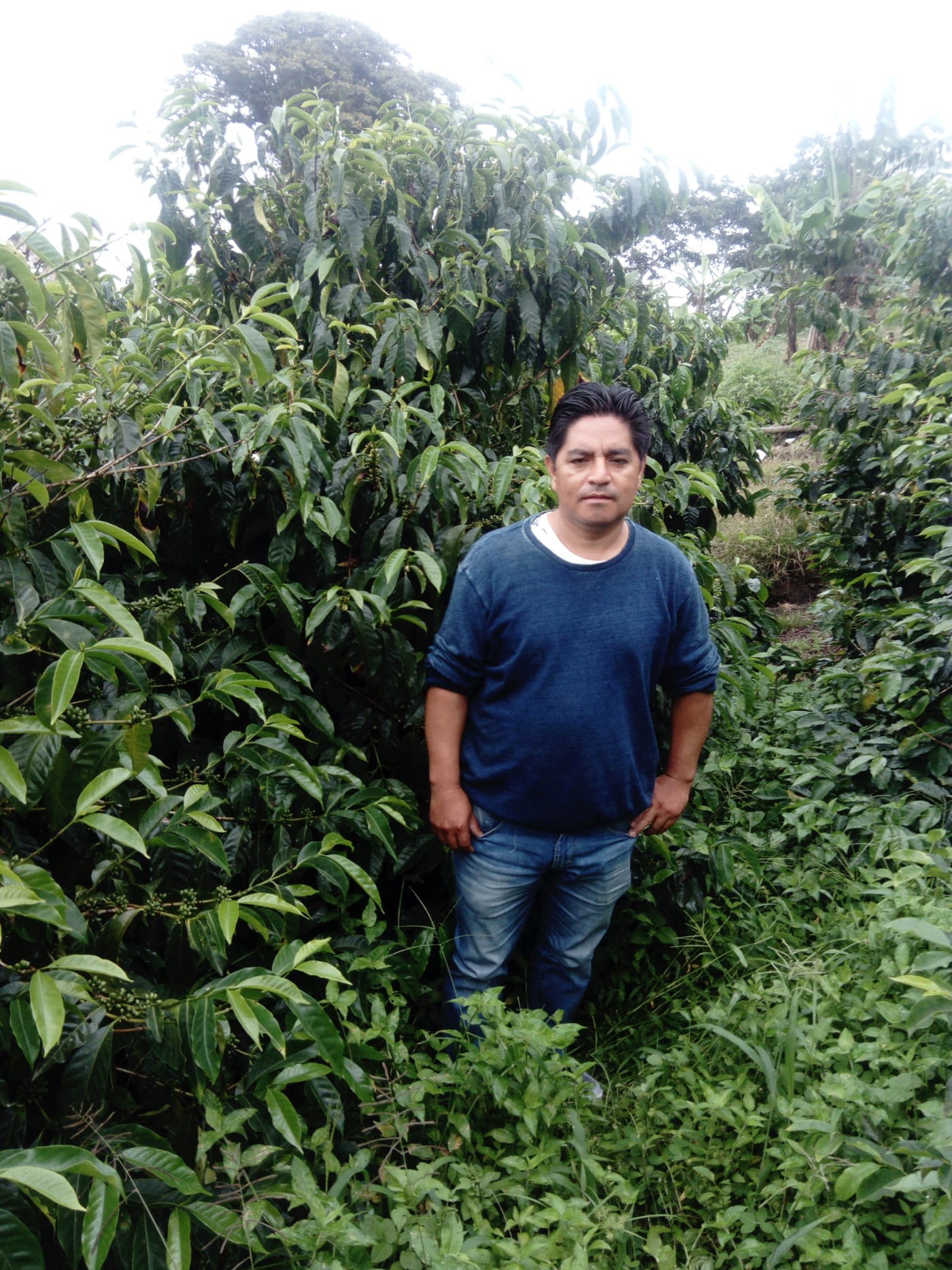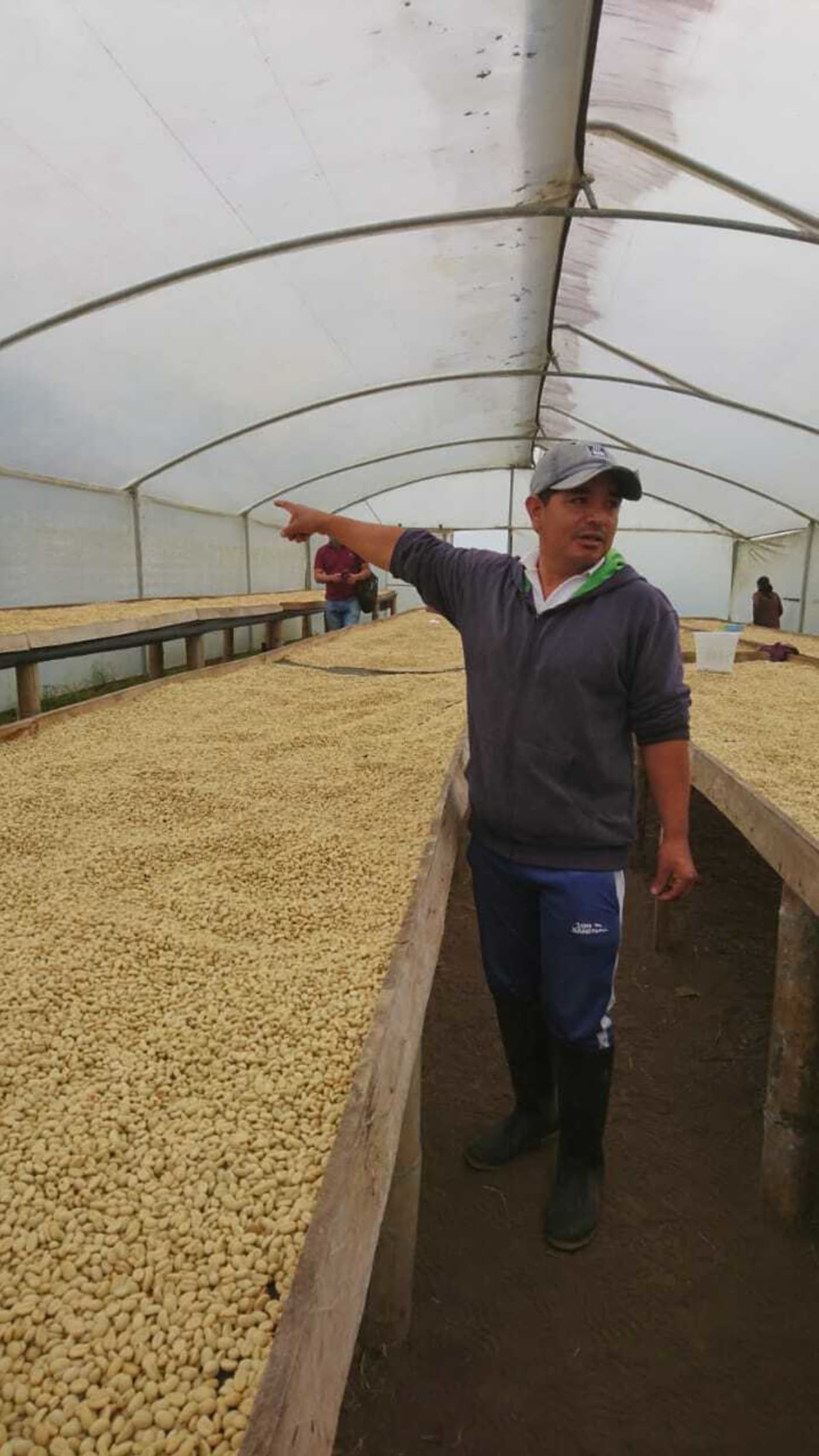-
Producer
-
Wilter Guillermo Lomas Lopez
-
Country
- Ecuador
-
Region
-
Parroquia
-
Altitude
-
1370m above sea level
-
Variety
-
Process
-
Body
-
-
Acidity
-
-
Tasting notes
-
Lime, lemon sherbet, black tea
-
Roast style
Ecuador
Finca La Colina
This Sidra from Wilter Guillermo is sweet and silky with lots of candy-like flavours. We taste lime, lemon sherbet, and black tea
The second Ecuadorian ever in our VS coffee lineup! This precious lot features an acclaimed Sidra varietal cultivated at a relatively low altitude.
VERY SPECIAL
Aside from a silky texture, candy-like flavours and overall fantastic profile, two additional facts made us pick Finca La Colina as the Very Special feature for early March ‘23.
First is the varietal. Sidra is rare, and we don’t know much about it (it’s not even listed on the World Coffee Research archive). However, it definitely has a reputation for its cupping potential, as more and more World Coffee Championship competitors choose to use it alongside Geisha.
Second is this lot’s higher-than-average price. Ecuadorian green coffees are generally more expensive than other producing countries’ due to a complex combination of political, economic and social factors (that we’ll try to summarise below).
All in all, a precious, tasty lot with some unusual traits—a true VS.

SIDRA VARIETAL
Sidra (also known as Sydra or Bourbon Sidra) is a relatively new hybrid varietal descending of Red Bourbon and Typica. It has acquired the sweetness and the body of the first and the bright taste and acidity of the second.
According to Daily Grind, it is believed that Sidra comes from the Pichincha province in Ecuador, where it may have been created as a research project by a Nestlé local breeding facility that developed hybrids using Ethiopian and Bourbon varieties.
ECUADOR: IT’S COMPLICATED
As Caravela Coffee tells us, the high price of Ecuadorian green coffees comes down to (1) low national supply/high global demand, (2) low productivity and yields compared to other producing countries and (3) very high costs of production (~2 times more expensive compared to its neighbours, caused by Ecuador’s dollarized economy). Add to this the toll of emigration, pushing the average age of farmers to “60 years old”. It really is complicated.
If we dig deeper, we find a curious aspect that may contribute to this global imbalance: Ecuador’s status as one of the largest exporters of instant coffee. Yes, quite weird.
While the country produces a small portion of the global green coffee output, it’s one of the largest exporters of instant coffee ( mainly to Germany and Russia, where this country has a wide presence and established reputation). To do that, they import high volumes of green coffee from other countries like Vietnam, which they mix, process and finally sell as a finished soluble (Ecuadorian) product.
For national coffee producers, it’s easy to enter this established market; it offers low risk and decent rewards. On the contrary, producing specialty coffee brings a lot of unknowns, fierce global competition and selling prices that are hard to match. No wonder there are few who dare.
On the bright side, looking at the future, there is a blooming generation of growers who believe there’s a fair life and business to be made by producing high-quality arabica beans. One of them is Wilter Guillermo—respect.
WILTER GUILLERMO’S DREAM
Like everyone here, Guillermo’s days start with a cup of coffee; he loves drinking it. Unlike everyone here, Guillermo decided to transform this passion into his profession, and even though he had no experience, he started his own coffee farm—Finca La Colina.
In 2014, he planted the first coffee trees. Even though he didn’t know much, the first harvest went relatively well; he made mistakes, and he learnt from them, but he also had many wins. It was all personal growth and self-learning, a dream come true.
In 2016, he produced a decent output: 540 kilograms of high-quality dry parchment that entered the specialty coffee market and, later that year, achieved 5th place in the Taza Dorada competition. Not bad for a beginner.

Despite all the highs, the hardships of agriculture crept up, and he had difficulties to produce a healthy, consistent harvest. He was close to giving up. Luckily, with the help of an agronomist and the support of Caravela’s PECA program he was able to introduce quality and environmental improvements that brought some stability and profit.
Today, he’s still here, and we feel damn lucky to drink Wilter Guillermo’s Very Special coffee.
THIS LOT
The cherries have grown at a relatively low altitude (~1370 masl) under partial shade provided by Guamo and Plantain trees. After being picked completely ripe, they’ve been fully washed and fermented for 14 hours, then dried on raised beds in a covered patio.

All images and information about this coffee and producers have been kindly shared by its importer, Caravela, and edited by us, Sample Coffee (unless linked to or credited otherwise).
Learn everything about this coffee:
Ethical, traceable sourcing
This page has all the sourcing information (variety, process, region, story, importer, and more) that our importers share with us, and give us permission to use.
The transparency helps us talk confidently about the quality and background of our product, and it helps you know exactly what you’re buying.
Learn more:
Coffee page transparency legend
Our coffee philosophy
Our business approach
Fresh harvest coffee
We only source and roast coffee from each country’s latest harvest season (so the green coffee is never older than 1 year from the time of picking, processing and packing). This ensures the sensory qualities are always at their peak and unaffected by excessive ageing.
Roasted for espresso and filter (best enjoyed black)
Roast style: omni. Omni roasts are designed to brew and taste great both as espresso and filter. Our omni single origins generally sit on Agtron values in the ~70-60 value range. So, technically, they are somewhere in the lighter side of the medium spectrum.
Designed for espresso and filter brewing. Best enjoyed black.
Learn more:
Our Loring Kestrel S35 roaster
Our roasting style and approach
Best brewed within days 15-49 post-roast
The ‘fresh is best’ saying doesn’t apply to coffee (contrary to popular belief). Waiting before opening and brewing your bag of whole coffee beans helps develop peak flavour and acidity.
But heads up: if you buy pre-ground coffee, brew it as soon as possible.
Learn more:
Our recommended brewing window
Try our custom brewing recipes
Our recipes and ratios are tailored to our coffee sourcing and roasting styles, bringing the best flavour and feel out of each coffee.
For pour over, immersion, and other filter brewing styles, check our brew guides.
For our espresso single origins, we recommend a coffee:yield ratio of 1:3:
- Dose: 20g ground coffee
- Yield: 60g espresso
- Total brew time: ~24-28 seconds
This is just a starting point! We encourage you to experiment, taste, and adjust to find the recipe that you enjoy the most.
Learn more:
Our espresso brew guide (single origin)
Brewing ratio calculator
Packaging and sustainability
- Bags: ABA-certified home compostable (AS 5810-2010)
- Labels: recyclable
- Valves (only on +250g bags): general waste
- Box and tape (online orders): recyclable
Learn more:
Our packaging
Variety
Sidra variety
Sidra (also known as Sydra or Bourbon Sidra) is a new hybrid varietal, made of Red Bourbon and Typica and combines characteristics of these two varieties. It has acquired the sweetness and the body of Red Bourbon and the bright taste and acidity of Typica.
The location
Coffee from Ecuador
For a long time most of Ecuador’s coffee production was for commodity grade export or the production of soluble coffees (freeze dried coffee). Only in the last few years has the potential of the country’s coffee production been really explored. We’re very excited about the potential Ecuador and have some truly exceptional coffees
Farm processes
Washed process
Machines are used to remove the flesh from the coffee cherry before being fermented in water, washed again, and finally sun dried. This process tends to result in more distinct, cleaner flavours.

Subscribe to a world of coffee
Discover a new single origin coffee from Sample every 1-5 weeks with no delivery fees.
No up-front purchase, and you can pause, cancel, or change plans at any time.
Available to order online this week:

Ethiopia Tadese Teko
Flavours of bergamot, mandarin, mango
Body Acidity
Washed Ethiopian Heirloom
January 2025 harvest
Roasted omni for filter and espresso
Ethiopia Tadese Teko online
Kenya Karimikui
Flavours of blood orange, blackberry, plum jam
Body Acidity
Washed Batian, SL28, SL34, Ruiru 11
November 2024 harvest
Roasted omni for filter and espresso
Kenya Karimikui online
Colombia Rigoberto Chavarro
Flavours of brown sugar, wine gum, candied stone fruit
Body Acidity
Washed Pink Bourbon
February 2025 harvest
Roasted omni for filter and espresso
Colombia Rigoberto Chavarro online
Rwanda Kibirizi
Flavours of mandarin, raisin, apple
Body Acidity
Washed Bourbon
June 2025 harvest
Roasted omni for filter and espresso
Rwanda Kibirizi online